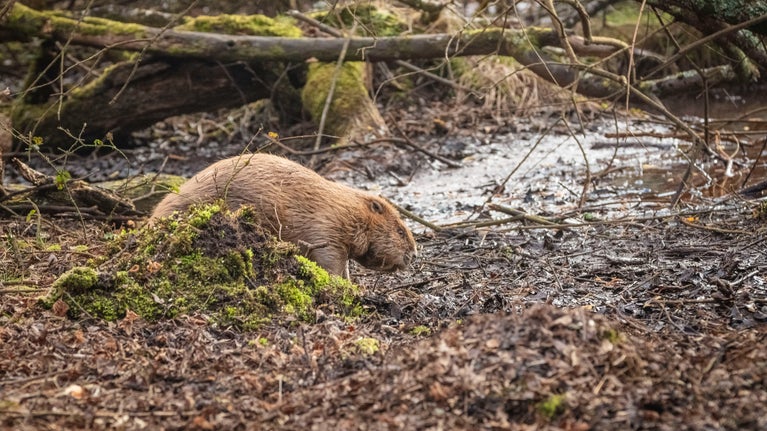Going wild! Historic first official wild beaver release marks new era for nature’s recovery in England
- Published:
- 05 March 2025

In a landmark event for nature conservation, the National Trust has legally released (today – Wednesday 5 March) the first two pairs of Eurasian beavers to live in the wild in Purbeck, Dorset.
This historic moment follows a ground breaking policy announcement by Defra and Natural England last Friday (28 February), paving the way for wild beaver releases.
For the first time since the 16th Century, these extraordinary creatures will be able to legally[1] roam freely across Purbeck, an area peppered with lakes and water courses, un-restricted by fenced enclosures.
Hunted to extinction on mainland Britain for their fur, meat, and scent glands, beavers are now set to play a crucial role in ecosystem restoration.
Beavers are nature’s engineers, creating wetland habitats that support countless other species. Their instinctive dam-building helps tackle the impacts of climate change by creating wetlands that retain water during floods and droughts, benefiting both nature and people. These natural dams also filter water, improving its quality downstream.
The beavers will spend the coming weeks settling into their new home at Little Sea, a 33-hectare (82 acre) lake on England’s first Super National Nature Reserve[2].
Relocated from the River Tay catchment in Scotland, by experts at the Beaver Trust[3], this release is the culmination of years of preparation[4] by the National Trust team and the local community.
Gen Crisford, Beaver Project Officer at Purbeck at the National Trust, shared her delight: “As a true believer in beavers, today is incredibly exciting, a real watershed moment in the history of the species in England.
“We have worked closely with Natural England for the past seven years to develop an approach for a licensed release of beavers into the Purbeck landscape.
“Our chosen site at Little Sea is highly suitable for these special creatures due to it being an expansive body of fresh water surrounded by dense willow woodland which will provide the beavers with plenty of food.
“As the lake is already deep enough, they won’t need to build dams initially, but by creating glades within the willow woodland, new areas of open wetlands will form to benefit many of the reserve’s rare species including water voles, keeled skimmer dragonflies and tiny ‘bladderwort’ carnivorous plants.
“Little Sea is at the heart of the 3,400 ha Purbeck Heaths Super National Nature Reserve making it an ideal landscape for the beavers to spread so that people can learn to co-exist with the mammals again.”
Together with the Wild Purbeck partnership which includes Natural England, other conservation NGOs, local landowners and farmers [5] the Trust has co-created a detailed management plan to support this historic wild release.
Gen continued: “Beavers can sometimes cause conflict when they colonise areas where they aren’t wanted, but by working with all the local landowners in advance to plan for their arrival and put measures in place where needed, we are confident that in Purbeck we will be able to demonstrate how beavers can work for everyone.
“Thanks to our previous licensed, fenced reintroductions of beavers at other National Trust sites, we have learnt a lot and have seen first-hand the benefits these clever mammals can bring, and how they can contribute massively to targets for nature recovery.”
Nature Minister Mary Creagh said: "I am thrilled that, after being hunted to extinction centuries ago, wild beavers are finally here to stay. Today is an important milestone for national nature recovery.
“Beavers are ecosystem engineers who bring multiple benefits for people, for wildlife and for landscapes. They are a keystone species and create thriving wetlands for wildlife, reduce flood risk and improve the water quality of our rivers.”
Marian Spain, Chief Executive of Natural England said: “This is an historic moment for nature in England. Beavers disappeared from our landscapes centuries ago and this release is the beginning of a new chance for these animals to thrive in the wild again.
“Beavers are much loved creatures which offer huge benefits for our landscapes, from creating wetland habitats to natural flood management. At Natural England, we will work closely with partners like the National Trust to ensure that wild beavers licensing effectively manages beaver populations and delivers positive impacts for people and nature."
Key to the beaver relocation from Scotland, Dr Roisin Campbell-Palmer, Head of Restoration at Beaver Trust added her enthusiasm: “We’re delighted to support England’s first wild release here today, it’s a great site for these animals and we look forward to supporting their expansion. In order to realise the societal benefits beavers can bring, their population needs far greater number across the country.
“We are generations behind the rest of Europe in bringing this species back. We do have high levels of public support for their return, so now we look forward to new sites coming forward under the agreed licensing process to facilitate population expansion."
This wild release is the fourth site where the National Trust has introduced beavers, following successful enclosed reintroductions at Holnicote Estate on Exmoor, the South Downs, and Wallington.
Harry Bowell, Director of Land and Nature at the National Trust, added: “Reintroducing native species which have previously disappeared from the landscape largely due to human intervention is incredibly humbling.
“Species such as beavers can have a critical impact in aiding nature’s recovery. In a relatively short space of time, they can create waterscapes brim-full of nature – work which would otherwise take years of costly human intervention.
“As one of the most nature-depleted countries in the world, it’s important to recognise all the advantages such introductions can bring. Today is a key step forward in meeting our national target to turn around this decline and put nature in recovery by 2030, and we’re pleased the Government has now made this possible.”
For more information and to support other National Trust species reintroduction and nature recovery projects, visit www.nationaltrust.org.uk/everyone-needs-nature-appeal